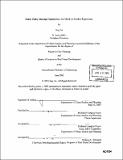Public policy through negotiations : the Mark-to-Market experience
Author(s)
An, Jing, 1978-
DownloadFull printable version (5.365Mb)
Other Contributors
Massachusetts Institute of Technology. Dept. of Urban Studies and Planning.
Advisor
Langley Keyes.
Terms of use
Metadata
Show full item recordAbstract
The traditional policy making process includes problem setting and solving; agenda setting, agreement getting and implementation. These stages take place chronologically through a top-down process in which public policies are usually made by "policy makers" and implemented bureaucratically. Since 1990s, public policy scholars have critiqued the old public policy paradigm and have proposed "a new paradigm". An example of that "new paradigm" was taking place in the federal government's affordable rental housing policies. This thesis is concerned with looking at an example of how a top-down policy became converted to the "new paradigm". It is concerned with how and why the change took place and how it actually played out in practice in the affordable housing field. This thesis firstly introduces the affordable housing programs produced through a topdown process, and then it analyzes the program flaws and the fundamental reason that caused the program flaws. After an introduction of the federal government's solution, Mark-to-Market under a "new paradigm", the thesis describes a successful example, the Hawthorne project, under Mark-to-Market and implemented through negotiation. It finally argues that because the affordable housing crisis in 1990s was very urgent and the HUD subsidy structure was very complicated, a top-down policy making could not work in that situation. On the contrary, the federal government made Mark-to-Market under a new paradigm through negotiation and policy debates among all the related parties. Mark-to-Market solved the problems by decoupling HUD's multiple functions to the market and implemented on a project base through negotiation among practitioners. Finally, policy making through negotiation not only makes policies more efficient and economically sound, but also makes policies adjustable to the evolving market, which is more sustainable.
Description
Thesis (M.C.P.)--Massachusetts Institute of Technology, Dept. of Urban Studies and Planning; and, (S.M. in Real Estate Development)--Massachusetts Institute of Technology, Dept. of Urban Studies and Planning, 2003. Includes bibliographical references (leaves 84-85).
Date issued
2003Department
Massachusetts Institute of Technology. Department of Urban Studies and PlanningPublisher
Massachusetts Institute of Technology
Keywords
Urban Studies and Planning.